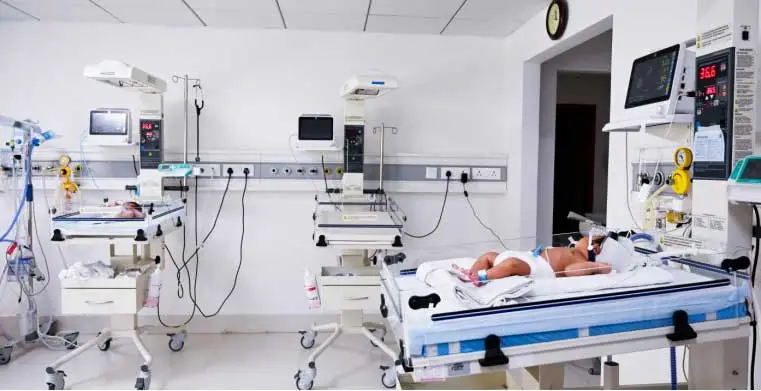NICU Facilities
NICU Facilities
NICU (Neonatal Intensive Care Unit) facilities are specialized hospital units that provide intensive care for newborns who are critically ill or premature. The NICU is equipped with advanced technology and staffed by trained healthcare professionals, including neonatologists, pediatricians, nurses, respiratory therapists, and other specialists, to support the health and development of these vulnerable infants.
Key Features and Functions of NICU Facilities
- Premature Babies:
One of the most common reasons a baby may require NICU care is premature birth (born before 37 weeks of gestation). Premature babies often have underdeveloped organs, particularly the lungs, heart, and digestive system, and need specialized monitoring and medical intervention to thrive. - Low Birth Weight:
Infants who are born with low birth weight (typically less than 5.5 pounds) may also require NICU care, as they may be at risk for breathing difficulties, feeding challenges, and other medical concerns. - Respiratory Support:
Babies born prematurely or with certain conditions may have difficulty breathing. NICUs are equipped with advanced respiratory support, including:- Ventilators: Machines that help babies breathe when they cannot do so on their own.
- CPAP (Continuous Positive Airway Pressure): A machine that provides constant air pressure to keep the baby’s airways open.
- Oxygen therapy: To help babies who have low oxygen levels in their blood.
- Monitoring and Equipment:
The NICU is equipped with various types of monitoring equipment, such as:- Cardiac monitors to track heart rate and rhythm.
- Pulse oximeters to measure oxygen levels in the blood.
- Incubators: Specialized heated beds that help maintain the infant’s body temperature.
- IV pumps: To administer fluids, medications, or nutrition.
- Feeding Support:
Babies in the NICU may struggle to feed orally due to prematurity or medical conditions. They may receive nutrition through:- Gavage feeding (tube feeding), where a tube is placed through the baby’s nose or mouth into the stomach.
- Breastfeeding or bottle-feeding may begin as the baby’s strength and ability to suck and swallow improve.
- Neurological Monitoring and Support:
Babies with brain development issues or who are at risk for neurological damage (e.g., due to prematurity or lack of oxygen) may require specialized care and monitoring, including:- Head ultrasounds: To check for brain bleeds or other abnormalities.
- Neurodevelopmental assessments: To monitor milestones and provide early interventions if necessary.
- Infection Control:
Newborns in the NICU, particularly preterm babies, are highly vulnerable to infections due to their underdeveloped immune systems. The NICU is designed to minimize exposure to infections through strict hygiene practices, isolation rooms, and limited visitation policies to protect infants. - Family Support:
NICUs often have policies and staff in place to support families emotionally and practically during their babies’ hospital stay. This may include:- Parent counseling and support groups.
- Breastfeeding assistance and lactation consultants.
- Rooming-in facilities where parents can stay close to their baby.
- Family-centered care where parents are involved in decision-making and in the daily care of their baby.
Levels of NICU Care
NICU facilities are often classified into different levels of care, depending on the severity of the newborn’s condition and the resources available:
- Level I – Well Newborn Nursery:
- This is for healthy, full-term infants who require minimal monitoring or care.
- The staff provides basic support, such as feeding and routine newborn care.
- Level II – Special Care Nursery:
- This unit cares for infants who are moderately premature (born at 32-35 weeks) or have mild health issues like jaundice or respiratory distress.
- Infants may require more specialized care, such as phototherapy for jaundice or oxygen therapy for breathing difficulties.
- Level III – Intensive Care Nursery:
- This is the highest level of NICU care and is equipped to handle critically ill or very premature babies (less than 32 weeks gestation) who need constant monitoring and advanced treatments.
- This level provides a wide range of services, including mechanical ventilation, surgery, and specialized imaging.
- Neonatologists and other specialists are available around the clock to care for these infants.
- Level IV – Regional NICU:
- A Level IV NICU is a specialized unit in a regional center that can provide the most intensive and complex care, including surgery for newborns with life-threatening conditions.
- These units have the highest levels of staff and technology and are capable of providing specialized treatments such as ECMO (Extracorporeal Membrane Oxygenation) for infants with severe heart or lung failure.
Common Reasons a Baby May Need NICU Care
Some common medical conditions that may require NICU care include:
- Premature birth (before 37 weeks of pregnancy).
- Respiratory distress syndrome (difficulty breathing due to underdeveloped lungs).
- Infections (such as sepsis, meningitis, or pneumonia).
- Jaundice (high bilirubin levels causing yellowing of the skin).
- Congenital heart defects or other birth defects that require surgery or monitoring.
- Hypoglycemia (low blood sugar levels).
- Neonatal seizures or other neurological issues.
- Birth injuries or complications from labor and delivery, such as brain bleeds.
NICU Length of Stay
The length of time a baby stays in the NICU can vary significantly depending on the severity of their condition and how well they progress. Some babies may only need a few days of care, while others may remain in the NICU for weeks or even months.
Discharge from the NICU
When a baby is stable and can maintain body temperature, breathe without support, and feed effectively, they may be ready for discharge. Prior to discharge, parents will be trained in newborn care, such as feeding, diapering, and recognizing signs of distress. Some babies may also require follow-up care after leaving the NICU to monitor their development.
Conclusion
NICU facilities provide essential care to newborns who are critically ill or born prematurely. They are equipped with advanced technology and staffed with specialists to help these vulnerable infants survive and thrive. While a NICU stay can be a stressful and emotional experience for families, the high level of care offered by these units plays a crucial role in saving lives and supporting the long-term health of newborns.
Need a Solution?
For unplanned pregnancy plans Contact Us

